Boeing's Performance Analysis: Strengths, Weaknesses, and Strategies
VerifiedAdded on 2022/09/11
|11
|2845
|14
Report
AI Summary
This report provides a comprehensive performance analysis of the Boeing Company, a global leader in the aerospace industry. It begins with an introduction and then delves into a detailed SWOT analysis, examining the company's strengths, weaknesses, opportunities, and threats, including market position, customer loyalty, R&D, brand portfolio, and financial aspects, as well as challenges like dependency on government contracts, past ethical issues, and competition. The report then explores Boeing's ethical practices, emphasizing its code of conduct, integrity, and commitment to ethical business standards, while also acknowledging past controversies. Corporate Social Responsibility (CSR) initiatives are analyzed, showcasing Boeing's investments in community programs, educational partnerships, and veteran support. The report then examines the importance of planning and organizational culture within Boeing, highlighting core values such as integrity, quality, safety, and diversity. The report also discusses Boeing's organizational structure, leadership style, and strategic recommendations for future success, including product differentiation to enhance competitiveness. In conclusion, the report emphasizes the significance of these factors in Boeing's overall performance and continued success in the market.
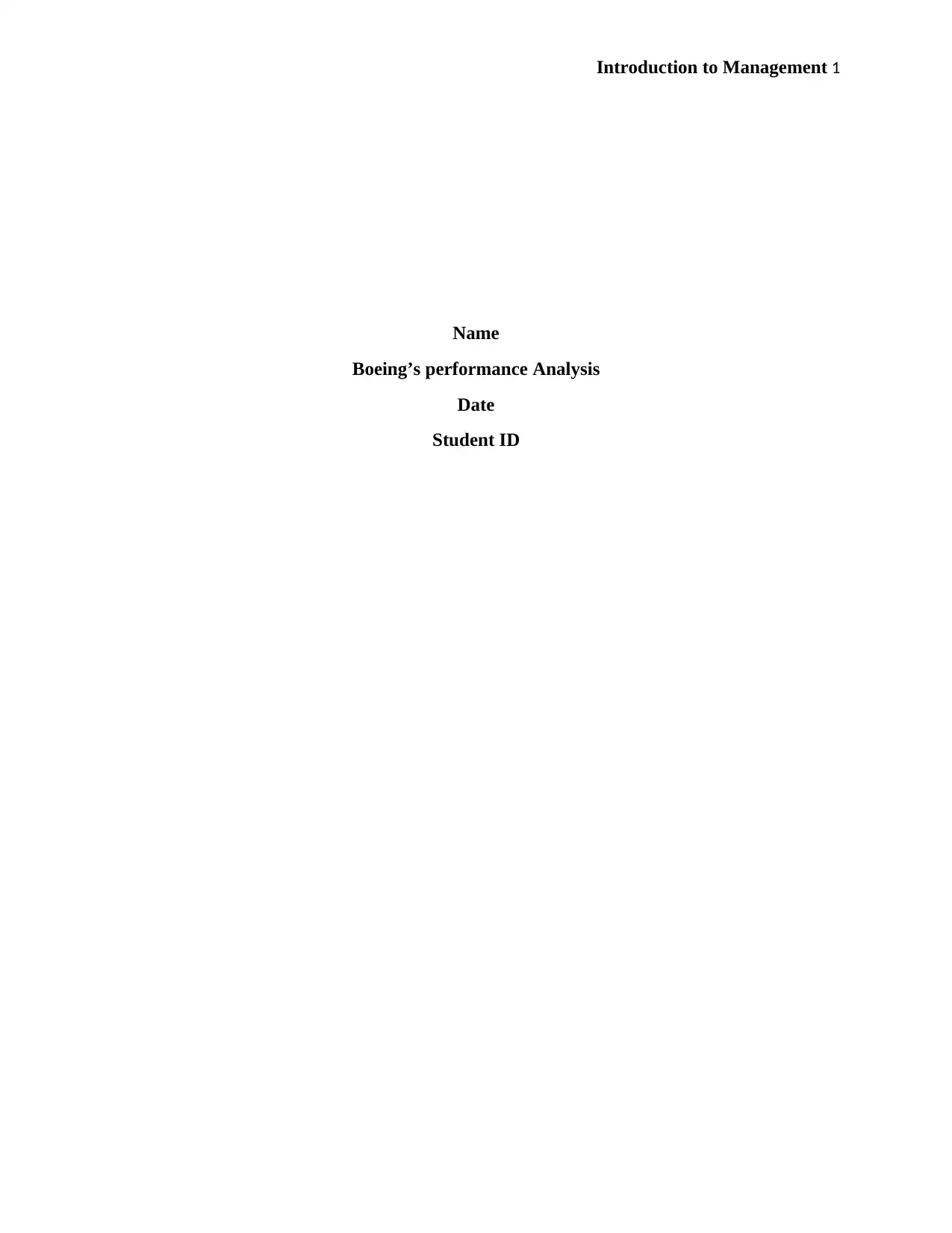
Introduction to Management 1
Name
Boeing’s performance Analysis
Date
Student ID
Name
Boeing’s performance Analysis
Date
Student ID
Paraphrase This Document
Need a fresh take? Get an instant paraphrase of this document with our AI Paraphraser
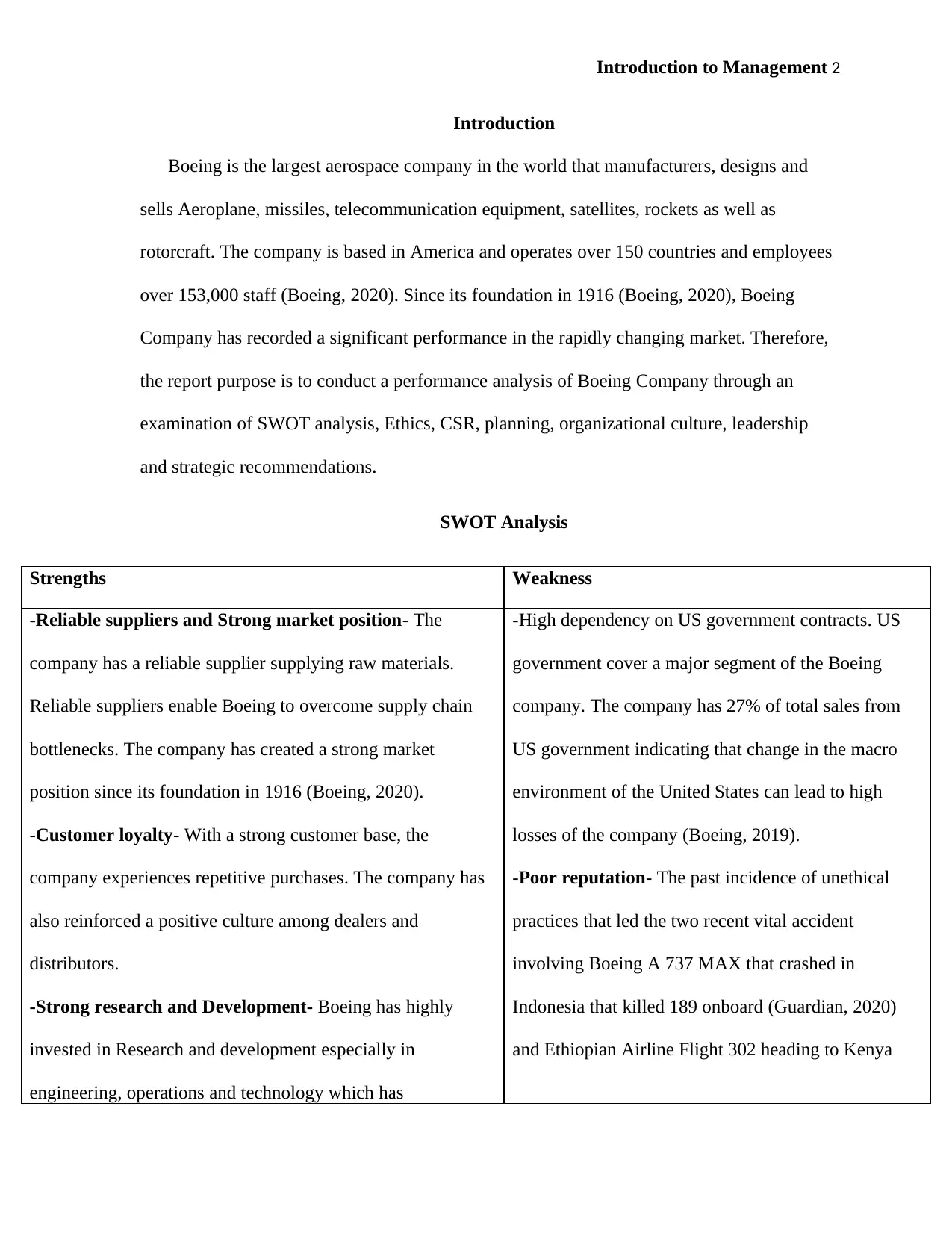
Introduction to Management 2
Introduction
Boeing is the largest aerospace company in the world that manufacturers, designs and
sells Aeroplane, missiles, telecommunication equipment, satellites, rockets as well as
rotorcraft. The company is based in America and operates over 150 countries and employees
over 153,000 staff (Boeing, 2020). Since its foundation in 1916 (Boeing, 2020), Boeing
Company has recorded a significant performance in the rapidly changing market. Therefore,
the report purpose is to conduct a performance analysis of Boeing Company through an
examination of SWOT analysis, Ethics, CSR, planning, organizational culture, leadership
and strategic recommendations.
SWOT Analysis
Strengths Weakness
-Reliable suppliers and Strong market position- The
company has a reliable supplier supplying raw materials.
Reliable suppliers enable Boeing to overcome supply chain
bottlenecks. The company has created a strong market
position since its foundation in 1916 (Boeing, 2020).
-Customer loyalty- With a strong customer base, the
company experiences repetitive purchases. The company has
also reinforced a positive culture among dealers and
distributors.
-Strong research and Development- Boeing has highly
invested in Research and development especially in
engineering, operations and technology which has
-High dependency on US government contracts. US
government cover a major segment of the Boeing
company. The company has 27% of total sales from
US government indicating that change in the macro
environment of the United States can lead to high
losses of the company (Boeing, 2019).
-Poor reputation- The past incidence of unethical
practices that led the two recent vital accident
involving Boeing A 737 MAX that crashed in
Indonesia that killed 189 onboard (Guardian, 2020)
and Ethiopian Airline Flight 302 heading to Kenya
Introduction
Boeing is the largest aerospace company in the world that manufacturers, designs and
sells Aeroplane, missiles, telecommunication equipment, satellites, rockets as well as
rotorcraft. The company is based in America and operates over 150 countries and employees
over 153,000 staff (Boeing, 2020). Since its foundation in 1916 (Boeing, 2020), Boeing
Company has recorded a significant performance in the rapidly changing market. Therefore,
the report purpose is to conduct a performance analysis of Boeing Company through an
examination of SWOT analysis, Ethics, CSR, planning, organizational culture, leadership
and strategic recommendations.
SWOT Analysis
Strengths Weakness
-Reliable suppliers and Strong market position- The
company has a reliable supplier supplying raw materials.
Reliable suppliers enable Boeing to overcome supply chain
bottlenecks. The company has created a strong market
position since its foundation in 1916 (Boeing, 2020).
-Customer loyalty- With a strong customer base, the
company experiences repetitive purchases. The company has
also reinforced a positive culture among dealers and
distributors.
-Strong research and Development- Boeing has highly
invested in Research and development especially in
engineering, operations and technology which has
-High dependency on US government contracts. US
government cover a major segment of the Boeing
company. The company has 27% of total sales from
US government indicating that change in the macro
environment of the United States can lead to high
losses of the company (Boeing, 2019).
-Poor reputation- The past incidence of unethical
practices that led the two recent vital accident
involving Boeing A 737 MAX that crashed in
Indonesia that killed 189 onboard (Guardian, 2020)
and Ethiopian Airline Flight 302 heading to Kenya
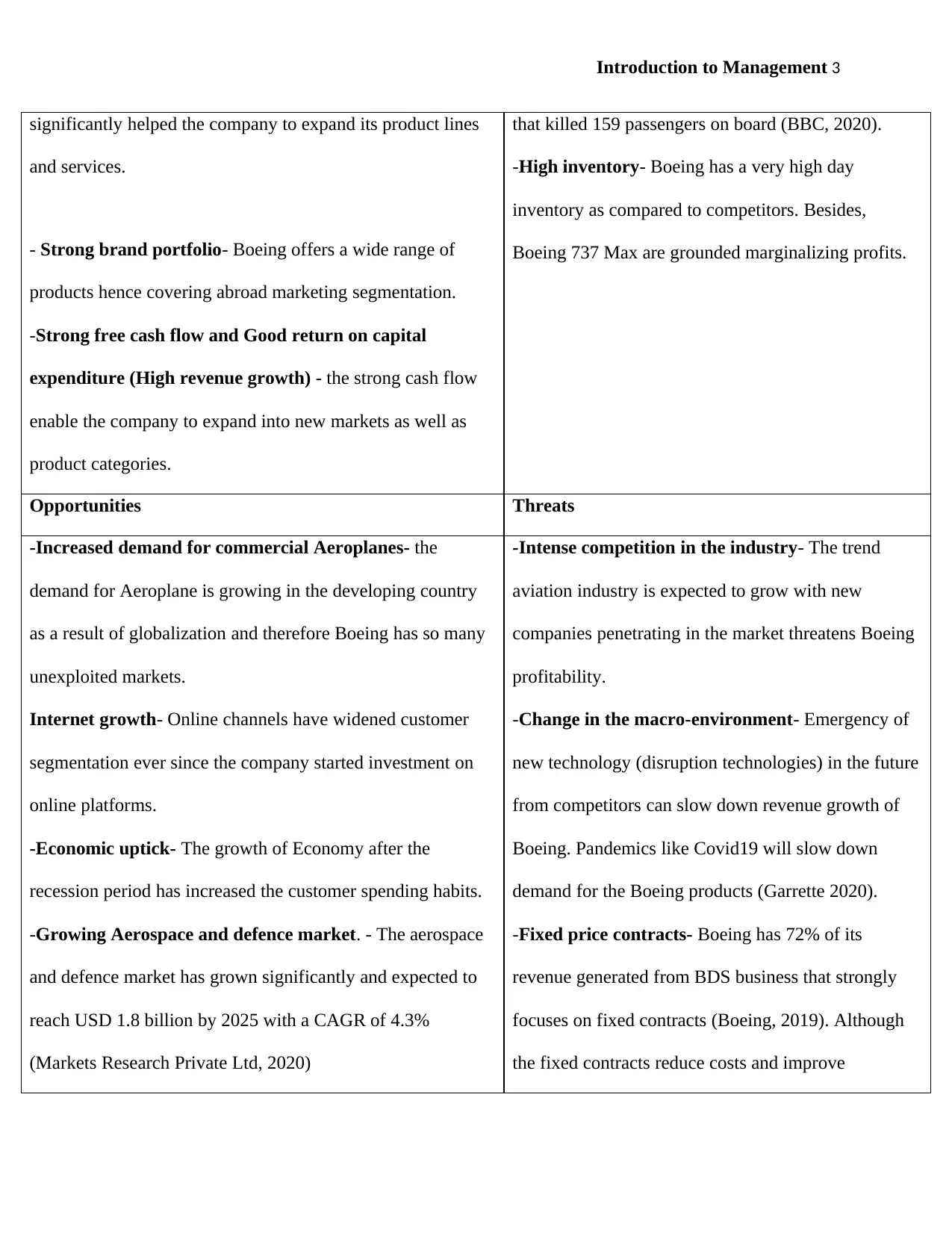
Introduction to Management 3
significantly helped the company to expand its product lines
and services.
- Strong brand portfolio- Boeing offers a wide range of
products hence covering abroad marketing segmentation.
-Strong free cash flow and Good return on capital
expenditure (High revenue growth) - the strong cash flow
enable the company to expand into new markets as well as
product categories.
that killed 159 passengers on board (BBC, 2020).
-High inventory- Boeing has a very high day
inventory as compared to competitors. Besides,
Boeing 737 Max are grounded marginalizing profits.
Opportunities Threats
-Increased demand for commercial Aeroplanes- the
demand for Aeroplane is growing in the developing country
as a result of globalization and therefore Boeing has so many
unexploited markets.
Internet growth- Online channels have widened customer
segmentation ever since the company started investment on
online platforms.
-Economic uptick- The growth of Economy after the
recession period has increased the customer spending habits.
-Growing Aerospace and defence market. - The aerospace
and defence market has grown significantly and expected to
reach USD 1.8 billion by 2025 with a CAGR of 4.3%
(Markets Research Private Ltd, 2020)
-Intense competition in the industry- The trend
aviation industry is expected to grow with new
companies penetrating in the market threatens Boeing
profitability.
-Change in the macro-environment- Emergency of
new technology (disruption technologies) in the future
from competitors can slow down revenue growth of
Boeing. Pandemics like Covid19 will slow down
demand for the Boeing products (Garrette 2020).
-Fixed price contracts- Boeing has 72% of its
revenue generated from BDS business that strongly
focuses on fixed contracts (Boeing, 2019). Although
the fixed contracts reduce costs and improve
significantly helped the company to expand its product lines
and services.
- Strong brand portfolio- Boeing offers a wide range of
products hence covering abroad marketing segmentation.
-Strong free cash flow and Good return on capital
expenditure (High revenue growth) - the strong cash flow
enable the company to expand into new markets as well as
product categories.
that killed 159 passengers on board (BBC, 2020).
-High inventory- Boeing has a very high day
inventory as compared to competitors. Besides,
Boeing 737 Max are grounded marginalizing profits.
Opportunities Threats
-Increased demand for commercial Aeroplanes- the
demand for Aeroplane is growing in the developing country
as a result of globalization and therefore Boeing has so many
unexploited markets.
Internet growth- Online channels have widened customer
segmentation ever since the company started investment on
online platforms.
-Economic uptick- The growth of Economy after the
recession period has increased the customer spending habits.
-Growing Aerospace and defence market. - The aerospace
and defence market has grown significantly and expected to
reach USD 1.8 billion by 2025 with a CAGR of 4.3%
(Markets Research Private Ltd, 2020)
-Intense competition in the industry- The trend
aviation industry is expected to grow with new
companies penetrating in the market threatens Boeing
profitability.
-Change in the macro-environment- Emergency of
new technology (disruption technologies) in the future
from competitors can slow down revenue growth of
Boeing. Pandemics like Covid19 will slow down
demand for the Boeing products (Garrette 2020).
-Fixed price contracts- Boeing has 72% of its
revenue generated from BDS business that strongly
focuses on fixed contracts (Boeing, 2019). Although
the fixed contracts reduce costs and improve
⊘ This is a preview!⊘
Do you want full access?
Subscribe today to unlock all pages.

Trusted by 1+ million students worldwide
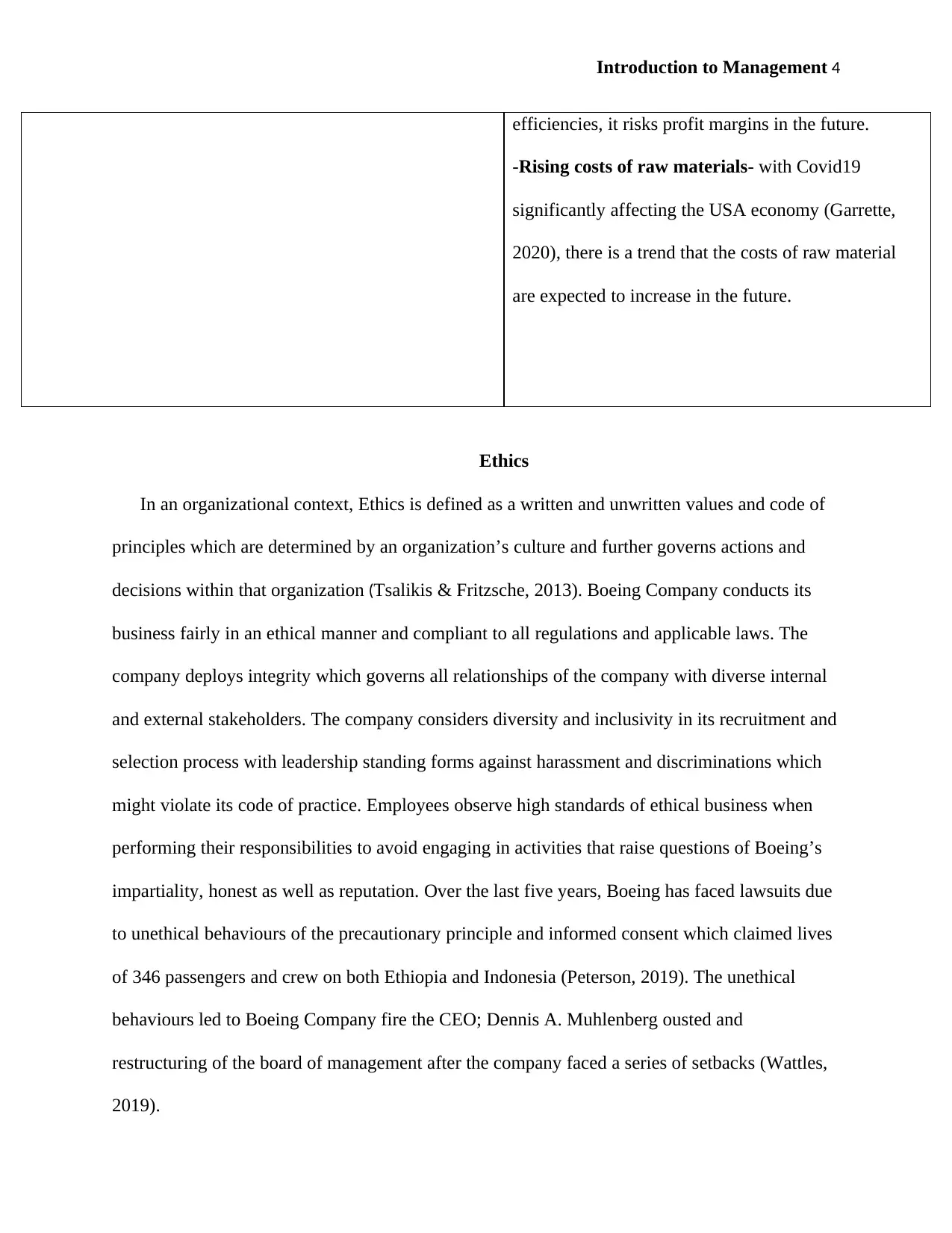
Introduction to Management 4
efficiencies, it risks profit margins in the future.
-Rising costs of raw materials- with Covid19
significantly affecting the USA economy (Garrette,
2020), there is a trend that the costs of raw material
are expected to increase in the future.
Ethics
In an organizational context, Ethics is defined as a written and unwritten values and code of
principles which are determined by an organization’s culture and further governs actions and
decisions within that organization (Tsalikis & Fritzsche, 2013). Boeing Company conducts its
business fairly in an ethical manner and compliant to all regulations and applicable laws. The
company deploys integrity which governs all relationships of the company with diverse internal
and external stakeholders. The company considers diversity and inclusivity in its recruitment and
selection process with leadership standing forms against harassment and discriminations which
might violate its code of practice. Employees observe high standards of ethical business when
performing their responsibilities to avoid engaging in activities that raise questions of Boeing’s
impartiality, honest as well as reputation. Over the last five years, Boeing has faced lawsuits due
to unethical behaviours of the precautionary principle and informed consent which claimed lives
of 346 passengers and crew on both Ethiopia and Indonesia (Peterson, 2019). The unethical
behaviours led to Boeing Company fire the CEO; Dennis A. Muhlenberg ousted and
restructuring of the board of management after the company faced a series of setbacks (Wattles,
2019).
efficiencies, it risks profit margins in the future.
-Rising costs of raw materials- with Covid19
significantly affecting the USA economy (Garrette,
2020), there is a trend that the costs of raw material
are expected to increase in the future.
Ethics
In an organizational context, Ethics is defined as a written and unwritten values and code of
principles which are determined by an organization’s culture and further governs actions and
decisions within that organization (Tsalikis & Fritzsche, 2013). Boeing Company conducts its
business fairly in an ethical manner and compliant to all regulations and applicable laws. The
company deploys integrity which governs all relationships of the company with diverse internal
and external stakeholders. The company considers diversity and inclusivity in its recruitment and
selection process with leadership standing forms against harassment and discriminations which
might violate its code of practice. Employees observe high standards of ethical business when
performing their responsibilities to avoid engaging in activities that raise questions of Boeing’s
impartiality, honest as well as reputation. Over the last five years, Boeing has faced lawsuits due
to unethical behaviours of the precautionary principle and informed consent which claimed lives
of 346 passengers and crew on both Ethiopia and Indonesia (Peterson, 2019). The unethical
behaviours led to Boeing Company fire the CEO; Dennis A. Muhlenberg ousted and
restructuring of the board of management after the company faced a series of setbacks (Wattles,
2019).
Paraphrase This Document
Need a fresh take? Get an instant paraphrase of this document with our AI Paraphraser
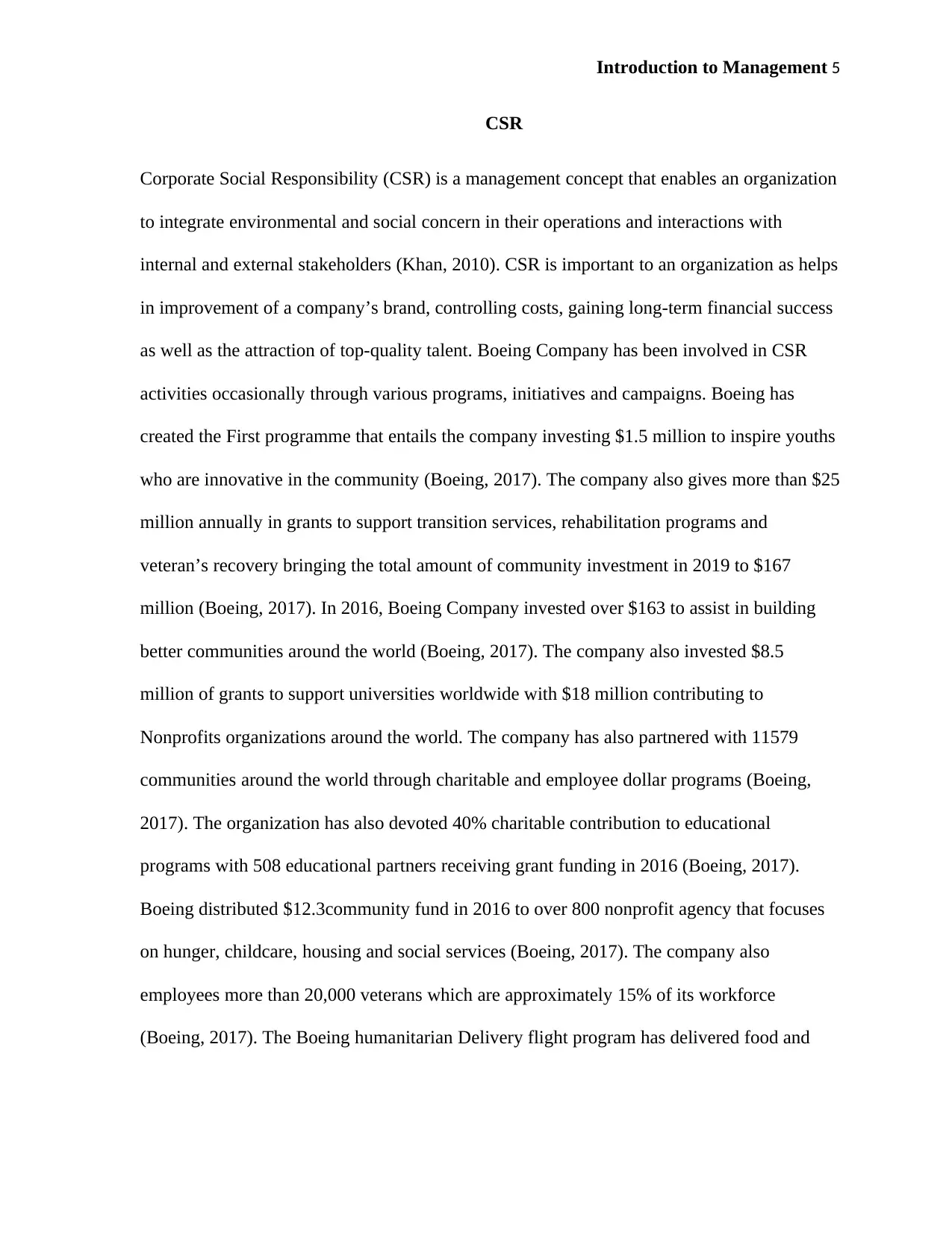
Introduction to Management 5
CSR
Corporate Social Responsibility (CSR) is a management concept that enables an organization
to integrate environmental and social concern in their operations and interactions with
internal and external stakeholders (Khan, 2010). CSR is important to an organization as helps
in improvement of a company’s brand, controlling costs, gaining long-term financial success
as well as the attraction of top-quality talent. Boeing Company has been involved in CSR
activities occasionally through various programs, initiatives and campaigns. Boeing has
created the First programme that entails the company investing $1.5 million to inspire youths
who are innovative in the community (Boeing, 2017). The company also gives more than $25
million annually in grants to support transition services, rehabilitation programs and
veteran’s recovery bringing the total amount of community investment in 2019 to $167
million (Boeing, 2017). In 2016, Boeing Company invested over $163 to assist in building
better communities around the world (Boeing, 2017). The company also invested $8.5
million of grants to support universities worldwide with $18 million contributing to
Nonprofits organizations around the world. The company has also partnered with 11579
communities around the world through charitable and employee dollar programs (Boeing,
2017). The organization has also devoted 40% charitable contribution to educational
programs with 508 educational partners receiving grant funding in 2016 (Boeing, 2017).
Boeing distributed $12.3community fund in 2016 to over 800 nonprofit agency that focuses
on hunger, childcare, housing and social services (Boeing, 2017). The company also
employees more than 20,000 veterans which are approximately 15% of its workforce
(Boeing, 2017). The Boeing humanitarian Delivery flight program has delivered food and
CSR
Corporate Social Responsibility (CSR) is a management concept that enables an organization
to integrate environmental and social concern in their operations and interactions with
internal and external stakeholders (Khan, 2010). CSR is important to an organization as helps
in improvement of a company’s brand, controlling costs, gaining long-term financial success
as well as the attraction of top-quality talent. Boeing Company has been involved in CSR
activities occasionally through various programs, initiatives and campaigns. Boeing has
created the First programme that entails the company investing $1.5 million to inspire youths
who are innovative in the community (Boeing, 2017). The company also gives more than $25
million annually in grants to support transition services, rehabilitation programs and
veteran’s recovery bringing the total amount of community investment in 2019 to $167
million (Boeing, 2017). In 2016, Boeing Company invested over $163 to assist in building
better communities around the world (Boeing, 2017). The company also invested $8.5
million of grants to support universities worldwide with $18 million contributing to
Nonprofits organizations around the world. The company has also partnered with 11579
communities around the world through charitable and employee dollar programs (Boeing,
2017). The organization has also devoted 40% charitable contribution to educational
programs with 508 educational partners receiving grant funding in 2016 (Boeing, 2017).
Boeing distributed $12.3community fund in 2016 to over 800 nonprofit agency that focuses
on hunger, childcare, housing and social services (Boeing, 2017). The company also
employees more than 20,000 veterans which are approximately 15% of its workforce
(Boeing, 2017). The Boeing humanitarian Delivery flight program has delivered food and
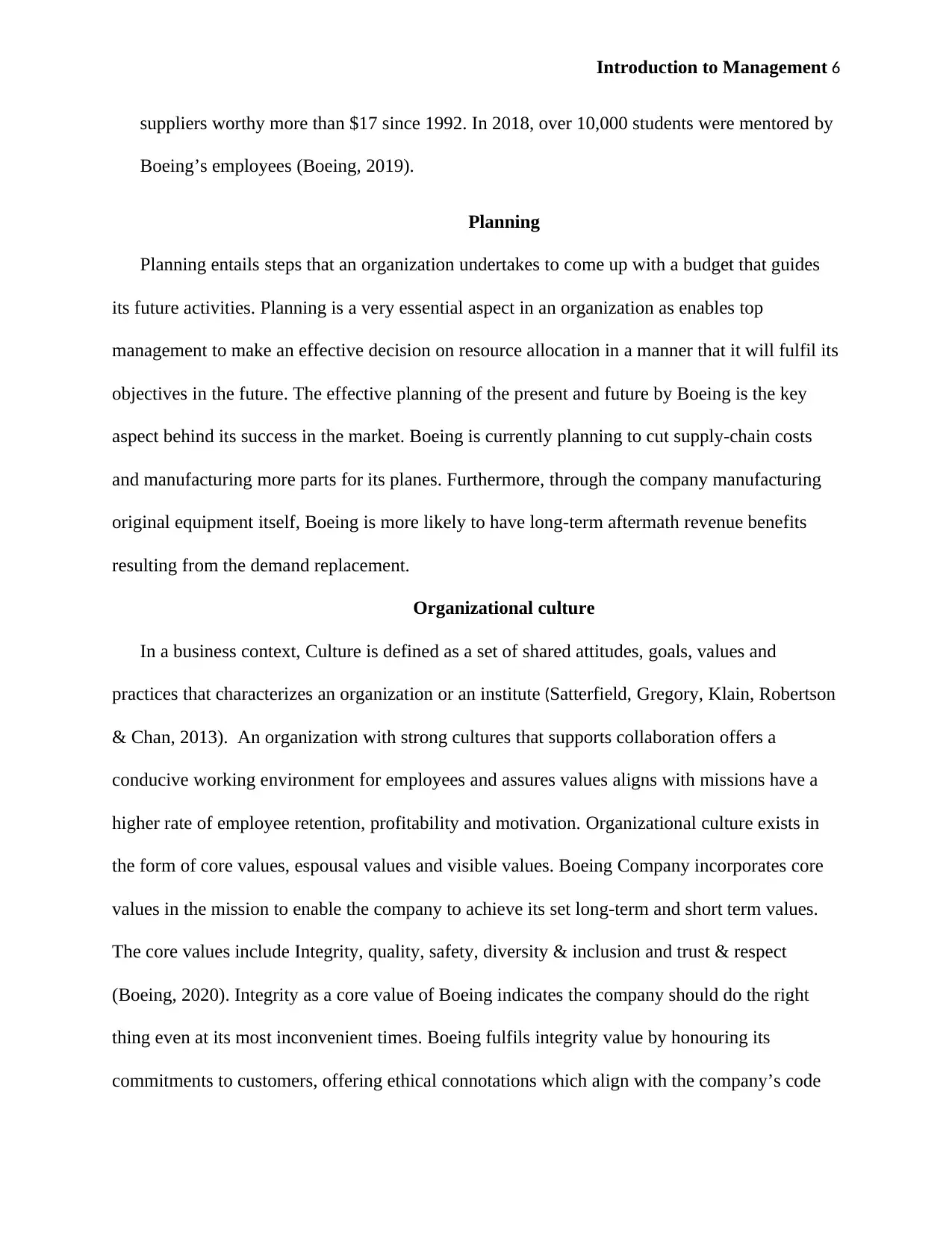
Introduction to Management 6
suppliers worthy more than $17 since 1992. In 2018, over 10,000 students were mentored by
Boeing’s employees (Boeing, 2019).
Planning
Planning entails steps that an organization undertakes to come up with a budget that guides
its future activities. Planning is a very essential aspect in an organization as enables top
management to make an effective decision on resource allocation in a manner that it will fulfil its
objectives in the future. The effective planning of the present and future by Boeing is the key
aspect behind its success in the market. Boeing is currently planning to cut supply-chain costs
and manufacturing more parts for its planes. Furthermore, through the company manufacturing
original equipment itself, Boeing is more likely to have long-term aftermath revenue benefits
resulting from the demand replacement.
Organizational culture
In a business context, Culture is defined as a set of shared attitudes, goals, values and
practices that characterizes an organization or an institute (Satterfield, Gregory, Klain, Robertson
& Chan, 2013). An organization with strong cultures that supports collaboration offers a
conducive working environment for employees and assures values aligns with missions have a
higher rate of employee retention, profitability and motivation. Organizational culture exists in
the form of core values, espousal values and visible values. Boeing Company incorporates core
values in the mission to enable the company to achieve its set long-term and short term values.
The core values include Integrity, quality, safety, diversity & inclusion and trust & respect
(Boeing, 2020). Integrity as a core value of Boeing indicates the company should do the right
thing even at its most inconvenient times. Boeing fulfils integrity value by honouring its
commitments to customers, offering ethical connotations which align with the company’s code
suppliers worthy more than $17 since 1992. In 2018, over 10,000 students were mentored by
Boeing’s employees (Boeing, 2019).
Planning
Planning entails steps that an organization undertakes to come up with a budget that guides
its future activities. Planning is a very essential aspect in an organization as enables top
management to make an effective decision on resource allocation in a manner that it will fulfil its
objectives in the future. The effective planning of the present and future by Boeing is the key
aspect behind its success in the market. Boeing is currently planning to cut supply-chain costs
and manufacturing more parts for its planes. Furthermore, through the company manufacturing
original equipment itself, Boeing is more likely to have long-term aftermath revenue benefits
resulting from the demand replacement.
Organizational culture
In a business context, Culture is defined as a set of shared attitudes, goals, values and
practices that characterizes an organization or an institute (Satterfield, Gregory, Klain, Robertson
& Chan, 2013). An organization with strong cultures that supports collaboration offers a
conducive working environment for employees and assures values aligns with missions have a
higher rate of employee retention, profitability and motivation. Organizational culture exists in
the form of core values, espousal values and visible values. Boeing Company incorporates core
values in the mission to enable the company to achieve its set long-term and short term values.
The core values include Integrity, quality, safety, diversity & inclusion and trust & respect
(Boeing, 2020). Integrity as a core value of Boeing indicates the company should do the right
thing even at its most inconvenient times. Boeing fulfils integrity value by honouring its
commitments to customers, offering ethical connotations which align with the company’s code
⊘ This is a preview!⊘
Do you want full access?
Subscribe today to unlock all pages.

Trusted by 1+ million students worldwide
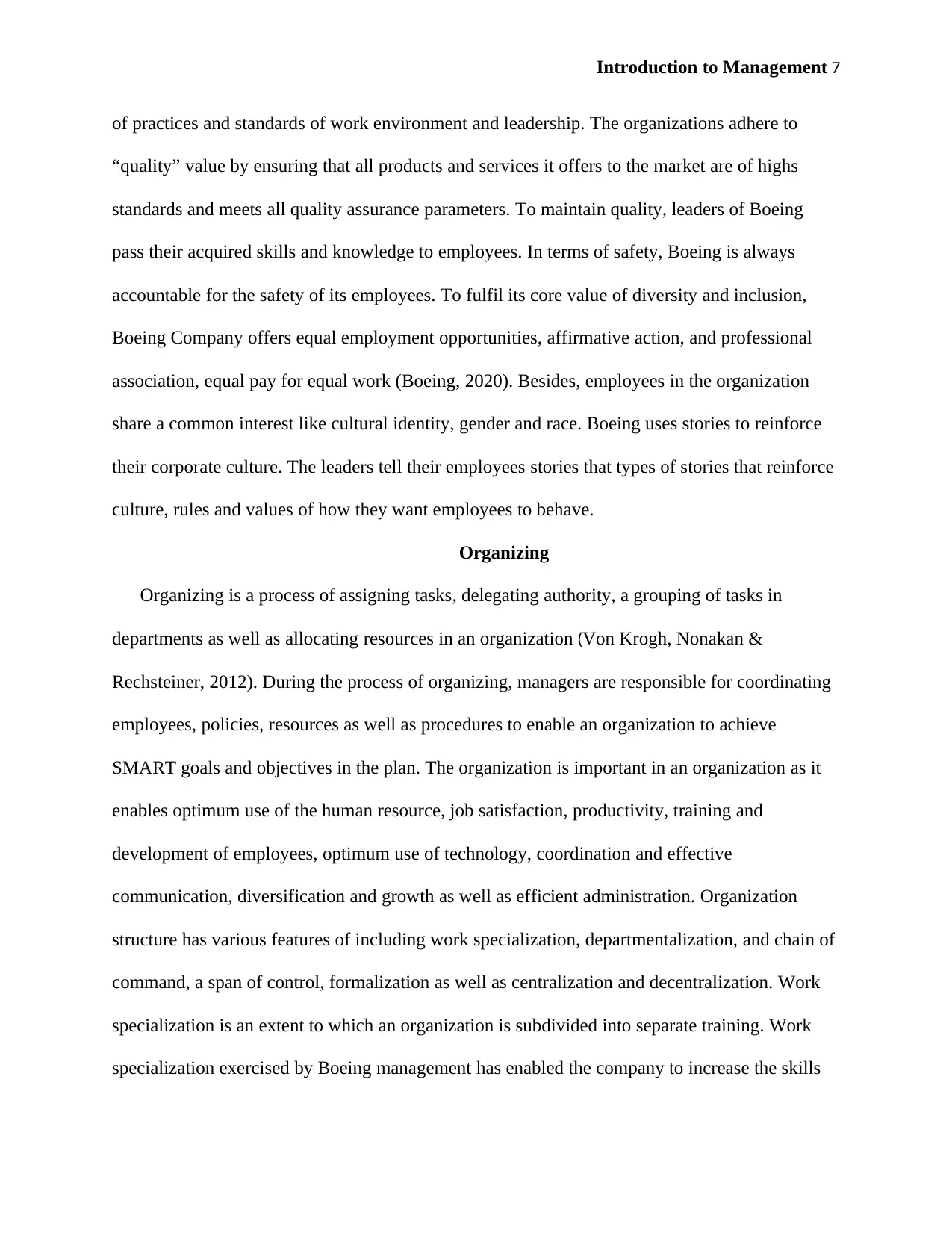
Introduction to Management 7
of practices and standards of work environment and leadership. The organizations adhere to
“quality” value by ensuring that all products and services it offers to the market are of highs
standards and meets all quality assurance parameters. To maintain quality, leaders of Boeing
pass their acquired skills and knowledge to employees. In terms of safety, Boeing is always
accountable for the safety of its employees. To fulfil its core value of diversity and inclusion,
Boeing Company offers equal employment opportunities, affirmative action, and professional
association, equal pay for equal work (Boeing, 2020). Besides, employees in the organization
share a common interest like cultural identity, gender and race. Boeing uses stories to reinforce
their corporate culture. The leaders tell their employees stories that types of stories that reinforce
culture, rules and values of how they want employees to behave.
Organizing
Organizing is a process of assigning tasks, delegating authority, a grouping of tasks in
departments as well as allocating resources in an organization (Von Krogh, Nonakan &
Rechsteiner, 2012). During the process of organizing, managers are responsible for coordinating
employees, policies, resources as well as procedures to enable an organization to achieve
SMART goals and objectives in the plan. The organization is important in an organization as it
enables optimum use of the human resource, job satisfaction, productivity, training and
development of employees, optimum use of technology, coordination and effective
communication, diversification and growth as well as efficient administration. Organization
structure has various features of including work specialization, departmentalization, and chain of
command, a span of control, formalization as well as centralization and decentralization. Work
specialization is an extent to which an organization is subdivided into separate training. Work
specialization exercised by Boeing management has enabled the company to increase the skills
of practices and standards of work environment and leadership. The organizations adhere to
“quality” value by ensuring that all products and services it offers to the market are of highs
standards and meets all quality assurance parameters. To maintain quality, leaders of Boeing
pass their acquired skills and knowledge to employees. In terms of safety, Boeing is always
accountable for the safety of its employees. To fulfil its core value of diversity and inclusion,
Boeing Company offers equal employment opportunities, affirmative action, and professional
association, equal pay for equal work (Boeing, 2020). Besides, employees in the organization
share a common interest like cultural identity, gender and race. Boeing uses stories to reinforce
their corporate culture. The leaders tell their employees stories that types of stories that reinforce
culture, rules and values of how they want employees to behave.
Organizing
Organizing is a process of assigning tasks, delegating authority, a grouping of tasks in
departments as well as allocating resources in an organization (Von Krogh, Nonakan &
Rechsteiner, 2012). During the process of organizing, managers are responsible for coordinating
employees, policies, resources as well as procedures to enable an organization to achieve
SMART goals and objectives in the plan. The organization is important in an organization as it
enables optimum use of the human resource, job satisfaction, productivity, training and
development of employees, optimum use of technology, coordination and effective
communication, diversification and growth as well as efficient administration. Organization
structure has various features of including work specialization, departmentalization, and chain of
command, a span of control, formalization as well as centralization and decentralization. Work
specialization is an extent to which an organization is subdivided into separate training. Work
specialization exercised by Boeing management has enabled the company to increase the skills
Paraphrase This Document
Need a fresh take? Get an instant paraphrase of this document with our AI Paraphraser
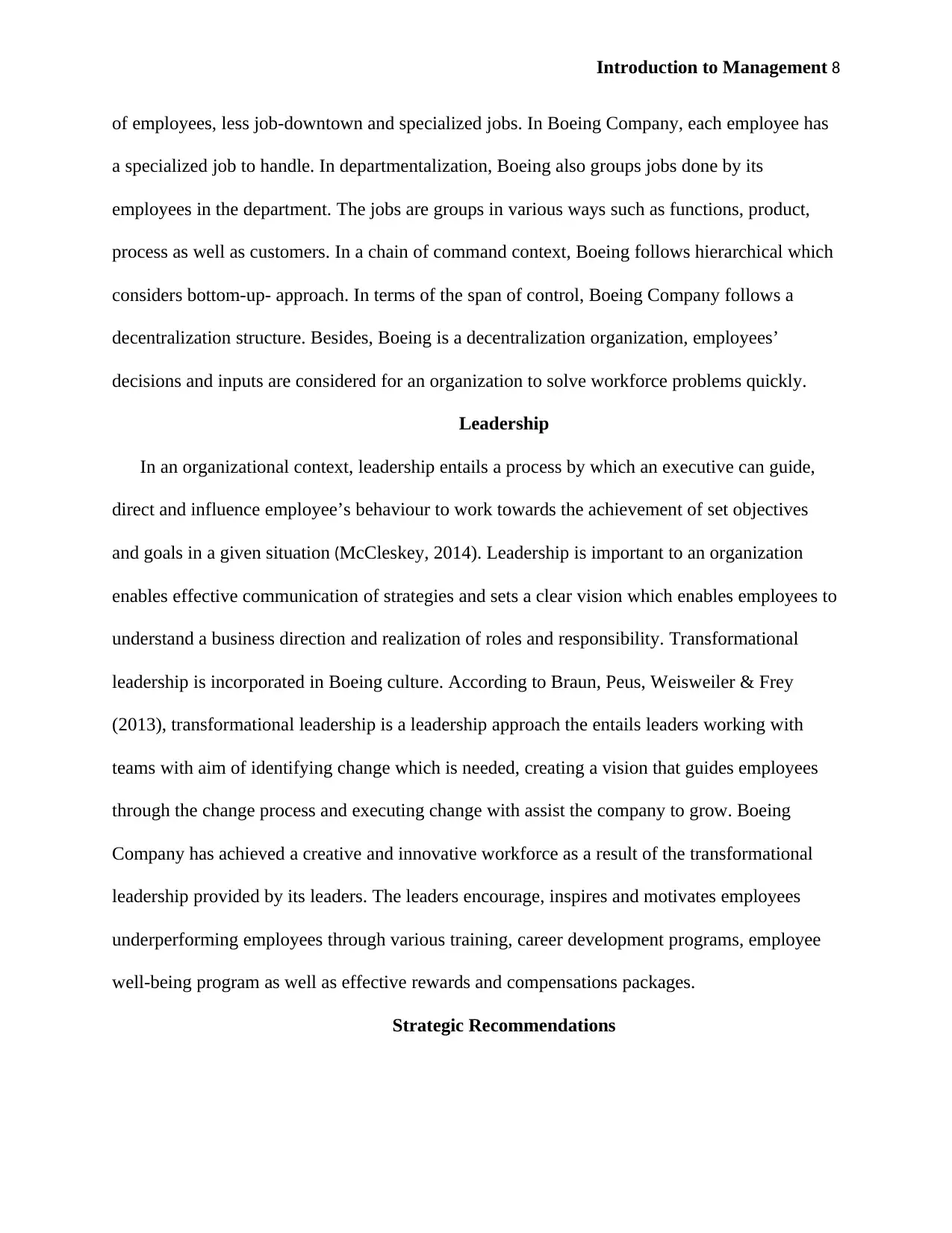
Introduction to Management 8
of employees, less job-downtown and specialized jobs. In Boeing Company, each employee has
a specialized job to handle. In departmentalization, Boeing also groups jobs done by its
employees in the department. The jobs are groups in various ways such as functions, product,
process as well as customers. In a chain of command context, Boeing follows hierarchical which
considers bottom-up- approach. In terms of the span of control, Boeing Company follows a
decentralization structure. Besides, Boeing is a decentralization organization, employees’
decisions and inputs are considered for an organization to solve workforce problems quickly.
Leadership
In an organizational context, leadership entails a process by which an executive can guide,
direct and influence employee’s behaviour to work towards the achievement of set objectives
and goals in a given situation (McCleskey, 2014). Leadership is important to an organization
enables effective communication of strategies and sets a clear vision which enables employees to
understand a business direction and realization of roles and responsibility. Transformational
leadership is incorporated in Boeing culture. According to Braun, Peus, Weisweiler & Frey
(2013), transformational leadership is a leadership approach the entails leaders working with
teams with aim of identifying change which is needed, creating a vision that guides employees
through the change process and executing change with assist the company to grow. Boeing
Company has achieved a creative and innovative workforce as a result of the transformational
leadership provided by its leaders. The leaders encourage, inspires and motivates employees
underperforming employees through various training, career development programs, employee
well-being program as well as effective rewards and compensations packages.
Strategic Recommendations
of employees, less job-downtown and specialized jobs. In Boeing Company, each employee has
a specialized job to handle. In departmentalization, Boeing also groups jobs done by its
employees in the department. The jobs are groups in various ways such as functions, product,
process as well as customers. In a chain of command context, Boeing follows hierarchical which
considers bottom-up- approach. In terms of the span of control, Boeing Company follows a
decentralization structure. Besides, Boeing is a decentralization organization, employees’
decisions and inputs are considered for an organization to solve workforce problems quickly.
Leadership
In an organizational context, leadership entails a process by which an executive can guide,
direct and influence employee’s behaviour to work towards the achievement of set objectives
and goals in a given situation (McCleskey, 2014). Leadership is important to an organization
enables effective communication of strategies and sets a clear vision which enables employees to
understand a business direction and realization of roles and responsibility. Transformational
leadership is incorporated in Boeing culture. According to Braun, Peus, Weisweiler & Frey
(2013), transformational leadership is a leadership approach the entails leaders working with
teams with aim of identifying change which is needed, creating a vision that guides employees
through the change process and executing change with assist the company to grow. Boeing
Company has achieved a creative and innovative workforce as a result of the transformational
leadership provided by its leaders. The leaders encourage, inspires and motivates employees
underperforming employees through various training, career development programs, employee
well-being program as well as effective rewards and compensations packages.
Strategic Recommendations
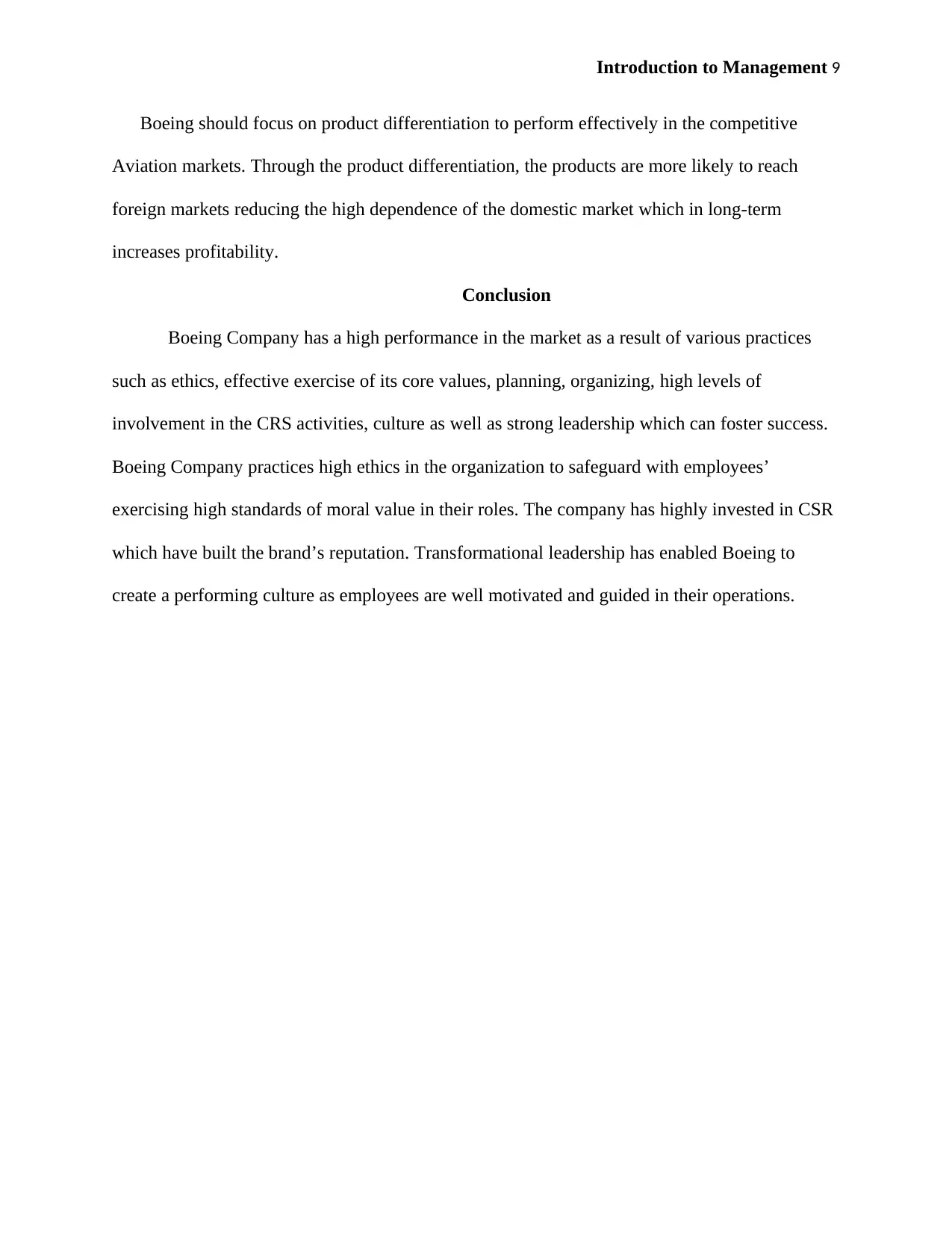
Introduction to Management 9
Boeing should focus on product differentiation to perform effectively in the competitive
Aviation markets. Through the product differentiation, the products are more likely to reach
foreign markets reducing the high dependence of the domestic market which in long-term
increases profitability.
Conclusion
Boeing Company has a high performance in the market as a result of various practices
such as ethics, effective exercise of its core values, planning, organizing, high levels of
involvement in the CRS activities, culture as well as strong leadership which can foster success.
Boeing Company practices high ethics in the organization to safeguard with employees’
exercising high standards of moral value in their roles. The company has highly invested in CSR
which have built the brand’s reputation. Transformational leadership has enabled Boeing to
create a performing culture as employees are well motivated and guided in their operations.
Boeing should focus on product differentiation to perform effectively in the competitive
Aviation markets. Through the product differentiation, the products are more likely to reach
foreign markets reducing the high dependence of the domestic market which in long-term
increases profitability.
Conclusion
Boeing Company has a high performance in the market as a result of various practices
such as ethics, effective exercise of its core values, planning, organizing, high levels of
involvement in the CRS activities, culture as well as strong leadership which can foster success.
Boeing Company practices high ethics in the organization to safeguard with employees’
exercising high standards of moral value in their roles. The company has highly invested in CSR
which have built the brand’s reputation. Transformational leadership has enabled Boeing to
create a performing culture as employees are well motivated and guided in their operations.
⊘ This is a preview!⊘
Do you want full access?
Subscribe today to unlock all pages.

Trusted by 1+ million students worldwide
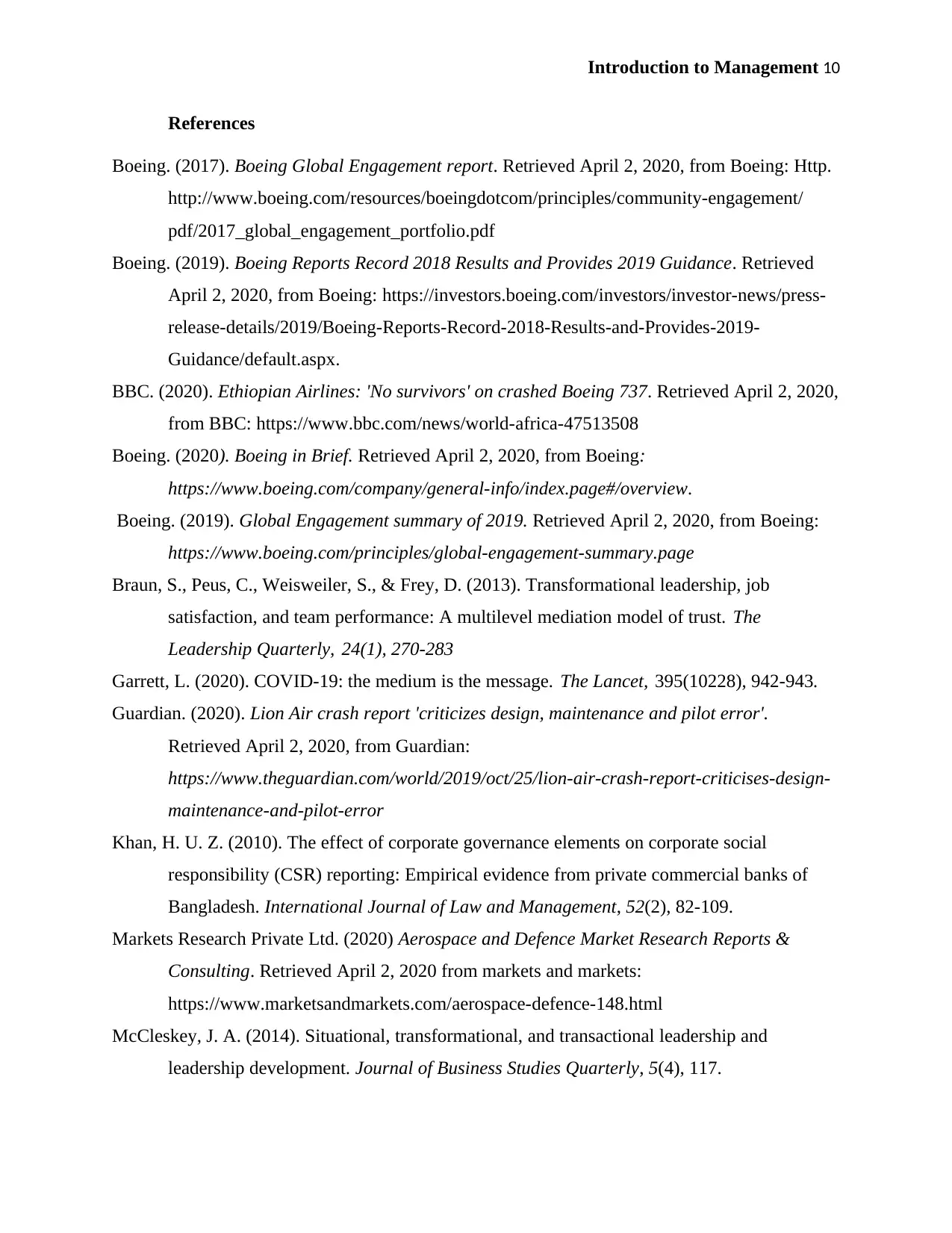
Introduction to Management 10
References
Boeing. (2017). Boeing Global Engagement report. Retrieved April 2, 2020, from Boeing: Http.
http://www.boeing.com/resources/boeingdotcom/principles/community-engagement/
pdf/2017_global_engagement_portfolio.pdf
Boeing. (2019). Boeing Reports Record 2018 Results and Provides 2019 Guidance. Retrieved
April 2, 2020, from Boeing: https://investors.boeing.com/investors/investor-news/press-
release-details/2019/Boeing-Reports-Record-2018-Results-and-Provides-2019-
Guidance/default.aspx.
BBC. (2020). Ethiopian Airlines: 'No survivors' on crashed Boeing 737. Retrieved April 2, 2020,
from BBC: https://www.bbc.com/news/world-africa-47513508
Boeing. (2020). Boeing in Brief. Retrieved April 2, 2020, from Boeing:
https://www.boeing.com/company/general-info/index.page#/overview.
Boeing. (2019). Global Engagement summary of 2019. Retrieved April 2, 2020, from Boeing:
https://www.boeing.com/principles/global-engagement-summary.page
Braun, S., Peus, C., Weisweiler, S., & Frey, D. (2013). Transformational leadership, job
satisfaction, and team performance: A multilevel mediation model of trust. The
Leadership Quarterly, 24(1), 270-283
Garrett, L. (2020). COVID-19: the medium is the message. The Lancet, 395(10228), 942-943.
Guardian. (2020). Lion Air crash report 'criticizes design, maintenance and pilot error'.
Retrieved April 2, 2020, from Guardian:
https://www.theguardian.com/world/2019/oct/25/lion-air-crash-report-criticises-design-
maintenance-and-pilot-error
Khan, H. U. Z. (2010). The effect of corporate governance elements on corporate social
responsibility (CSR) reporting: Empirical evidence from private commercial banks of
Bangladesh. International Journal of Law and Management, 52(2), 82-109.
Markets Research Private Ltd. (2020) Aerospace and Defence Market Research Reports &
Consulting. Retrieved April 2, 2020 from markets and markets:
https://www.marketsandmarkets.com/aerospace-defence-148.html
McCleskey, J. A. (2014). Situational, transformational, and transactional leadership and
leadership development. Journal of Business Studies Quarterly, 5(4), 117.
References
Boeing. (2017). Boeing Global Engagement report. Retrieved April 2, 2020, from Boeing: Http.
http://www.boeing.com/resources/boeingdotcom/principles/community-engagement/
pdf/2017_global_engagement_portfolio.pdf
Boeing. (2019). Boeing Reports Record 2018 Results and Provides 2019 Guidance. Retrieved
April 2, 2020, from Boeing: https://investors.boeing.com/investors/investor-news/press-
release-details/2019/Boeing-Reports-Record-2018-Results-and-Provides-2019-
Guidance/default.aspx.
BBC. (2020). Ethiopian Airlines: 'No survivors' on crashed Boeing 737. Retrieved April 2, 2020,
from BBC: https://www.bbc.com/news/world-africa-47513508
Boeing. (2020). Boeing in Brief. Retrieved April 2, 2020, from Boeing:
https://www.boeing.com/company/general-info/index.page#/overview.
Boeing. (2019). Global Engagement summary of 2019. Retrieved April 2, 2020, from Boeing:
https://www.boeing.com/principles/global-engagement-summary.page
Braun, S., Peus, C., Weisweiler, S., & Frey, D. (2013). Transformational leadership, job
satisfaction, and team performance: A multilevel mediation model of trust. The
Leadership Quarterly, 24(1), 270-283
Garrett, L. (2020). COVID-19: the medium is the message. The Lancet, 395(10228), 942-943.
Guardian. (2020). Lion Air crash report 'criticizes design, maintenance and pilot error'.
Retrieved April 2, 2020, from Guardian:
https://www.theguardian.com/world/2019/oct/25/lion-air-crash-report-criticises-design-
maintenance-and-pilot-error
Khan, H. U. Z. (2010). The effect of corporate governance elements on corporate social
responsibility (CSR) reporting: Empirical evidence from private commercial banks of
Bangladesh. International Journal of Law and Management, 52(2), 82-109.
Markets Research Private Ltd. (2020) Aerospace and Defence Market Research Reports &
Consulting. Retrieved April 2, 2020 from markets and markets:
https://www.marketsandmarkets.com/aerospace-defence-148.html
McCleskey, J. A. (2014). Situational, transformational, and transactional leadership and
leadership development. Journal of Business Studies Quarterly, 5(4), 117.
Paraphrase This Document
Need a fresh take? Get an instant paraphrase of this document with our AI Paraphraser
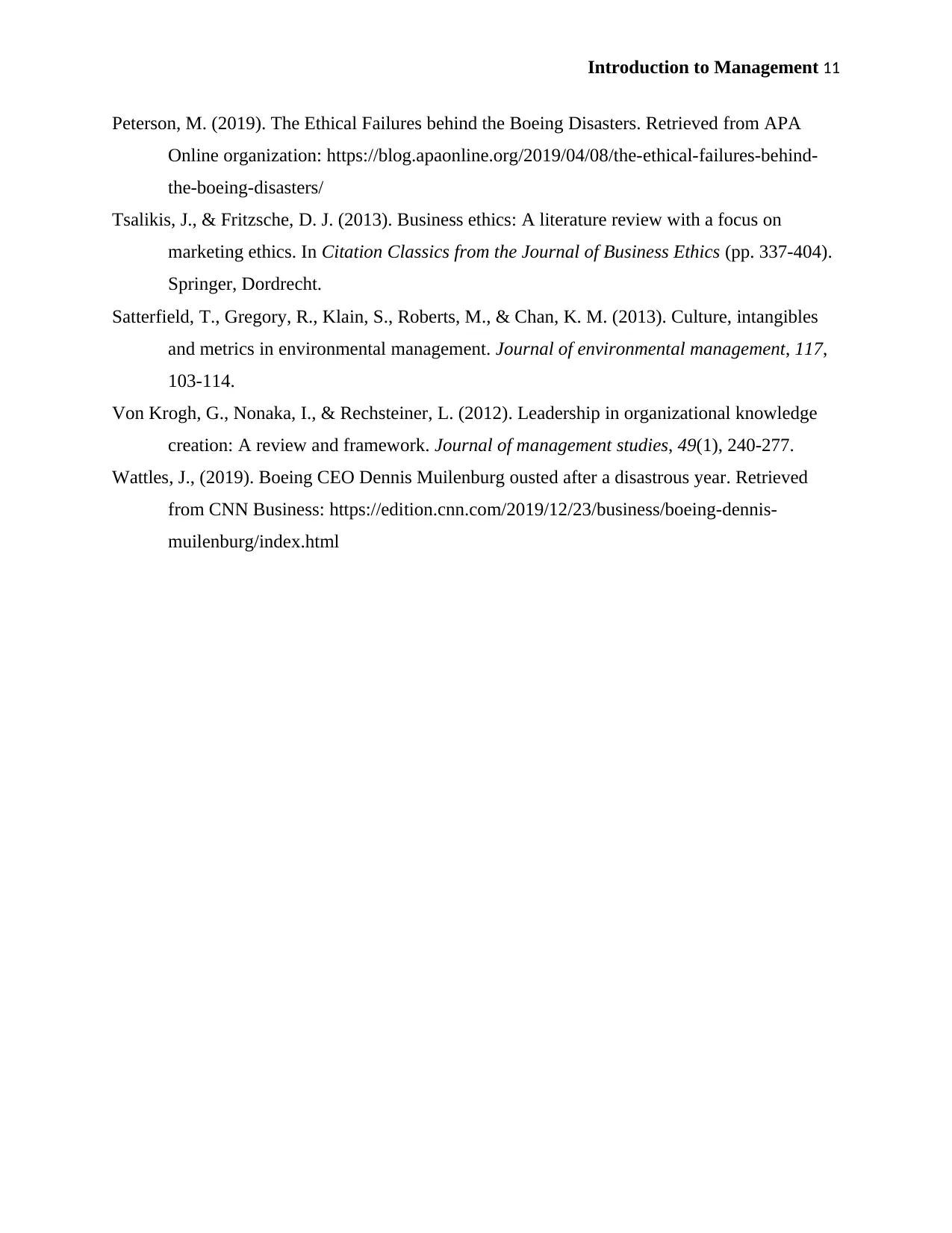
Introduction to Management 11
Peterson, M. (2019). The Ethical Failures behind the Boeing Disasters. Retrieved from APA
Online organization: https://blog.apaonline.org/2019/04/08/the-ethical-failures-behind-
the-boeing-disasters/
Tsalikis, J., & Fritzsche, D. J. (2013). Business ethics: A literature review with a focus on
marketing ethics. In Citation Classics from the Journal of Business Ethics (pp. 337-404).
Springer, Dordrecht.
Satterfield, T., Gregory, R., Klain, S., Roberts, M., & Chan, K. M. (2013). Culture, intangibles
and metrics in environmental management. Journal of environmental management, 117,
103-114.
Von Krogh, G., Nonaka, I., & Rechsteiner, L. (2012). Leadership in organizational knowledge
creation: A review and framework. Journal of management studies, 49(1), 240-277.
Wattles, J., (2019). Boeing CEO Dennis Muilenburg ousted after a disastrous year. Retrieved
from CNN Business: https://edition.cnn.com/2019/12/23/business/boeing-dennis-
muilenburg/index.html
Peterson, M. (2019). The Ethical Failures behind the Boeing Disasters. Retrieved from APA
Online organization: https://blog.apaonline.org/2019/04/08/the-ethical-failures-behind-
the-boeing-disasters/
Tsalikis, J., & Fritzsche, D. J. (2013). Business ethics: A literature review with a focus on
marketing ethics. In Citation Classics from the Journal of Business Ethics (pp. 337-404).
Springer, Dordrecht.
Satterfield, T., Gregory, R., Klain, S., Roberts, M., & Chan, K. M. (2013). Culture, intangibles
and metrics in environmental management. Journal of environmental management, 117,
103-114.
Von Krogh, G., Nonaka, I., & Rechsteiner, L. (2012). Leadership in organizational knowledge
creation: A review and framework. Journal of management studies, 49(1), 240-277.
Wattles, J., (2019). Boeing CEO Dennis Muilenburg ousted after a disastrous year. Retrieved
from CNN Business: https://edition.cnn.com/2019/12/23/business/boeing-dennis-
muilenburg/index.html
1 out of 11
Related Documents
Your All-in-One AI-Powered Toolkit for Academic Success.
+13062052269
info@desklib.com
Available 24*7 on WhatsApp / Email
![[object Object]](/_next/static/media/star-bottom.7253800d.svg)
Unlock your academic potential
Copyright © 2020–2026 A2Z Services. All Rights Reserved. Developed and managed by ZUCOL.





